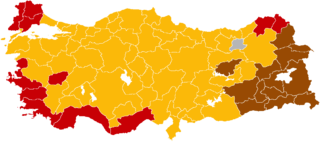
General elections were held in Turkey on 3 November 2002 following the collapse of the Democratic Left Party–Nationalist Movement Party–Motherland Party coalition led by Bülent Ecevit. All 550 members of the Grand National Assembly were up for election.
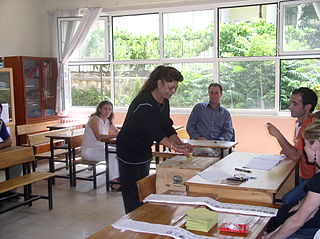
General elections were held in Turkey on 22 July 2007 to elect 550 members to the Grand National Assembly. Originally scheduled for November, the elections were brought forward after parliament failed to elect a new president to replace Ahmet Necdet Sezer. The result was a resounding victory for the incumbent Justice and Development Party (AKP), which won 46.6% of the vote and 341 seats. The party's leader Recep Tayyip Erdoğan was consequently re-elected as Prime Minister of Turkey. The opposition Republican People's Party (CHP) came second with 20.9% of the vote and took 112 seats. The Nationalist Movement Party (MHP), which had failed to surpass the 10% election threshold in the 2002 election, re-entered parliament with 14.3% of the vote and 71 MPs. The election was fought mostly on Turkey's debate over laïcité that had been perceived to be under threat from the AKP's nomination of Foreign Minister Abdullah Gül, an Islamist politician, for the Presidency. Developments in Iraq, secular and religious concerns, the intervention of the military in political issues, European Union membership negotiations, the United States and the Muslim world were other main issues.

General elections were held in Turkey on 12 June 2011 to elect the 550 members of Grand National Assembly. In accordance to the result of the constitutional referendum held in 2007, the elections were held four years after the previous elections in 2007 instead of five.

Recep Tayyip Erdoğan, the 25th prime minister and 12th president of Turkey, was born on 26 February 1954, in Istanbul, Turkey.

Presidential elections were held in Turkey on 10 August 2014 in order to elect the 12th President. Prime Minister Recep Tayyip Erdoğan was elected outright with an absolute majority of the vote in the first round, making a scheduled run-off for 24 August unnecessary.
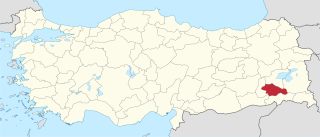
Siirt is an electoral district of the Grand National Assembly of Turkey. It elects three members of parliament (deputies) to represent the province of the same name for a four-year term by the D'Hondt method, a party-list proportional representation system.
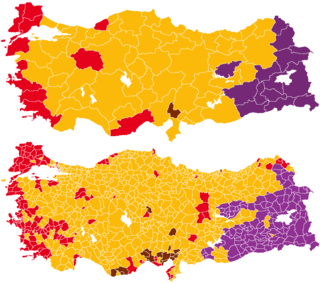
General elections were held in Turkey on 7 June 2015 to elect 550 members to the Grand National Assembly. This was the 24th general election in the history of the Turkish Republic, electing the country's 25th Parliament. The result was the first hung parliament since the 1999 general elections. Unsuccessful attempts to form a coalition government resulted in a snap general election being called for November 2015.

Local elections were held in Turkey on 30 March 2014, with some repeated on 1 June 2014. Metropolitan and district mayors as well as their municipal council members in cities, and muhtars and "elderly councils" in rural areas were elected. In light of the controversy around the elections, it was viewed as a referendum on the government of Prime Minister Recep Tayyip Erdoğan. About 50 million people were eligible to vote.
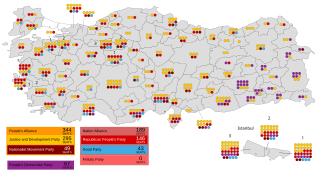
General elections were held in Turkey on 24 June 2018. Presidential elections were held to elect the President of Turkey using a two-round system. Parliamentary elections took place to elect 600 Members of Parliament to the Grand National Assembly of Turkey.
In the run-up to, during and after the Turkish general election of June 2015, numerous accusations of electoral fraud and violence were made by opposition parties. Electoral fraud in Turkey has usually been most extensive during local elections, where individual votes have significantly larger impact in determining local administrations. Although the 2014 presidential election saw little evidence of electoral misconduct, issues regarding voter records as well as extensive media bias have been controversial issues that have remained largely unaddressed. In both the local and presidential elections in 2014, several voters reported that ballot papers had been sent to addresses that are wrong or do not exist as well as voters that have been dead for a substantial amount of time.
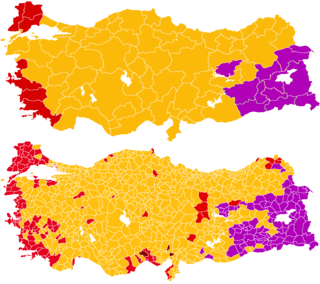
General elections were held in Turkey on 1 November 2015 to elect 550 members to the Grand National Assembly. They were the 25th general elections in the History of the Republic of Turkey and elected the country's 26th Parliament. The election resulted in the Justice and Development Party (AKP) regaining a Parliamentary majority following a 'shock' victory, having lost it five months earlier in the June 2015 general elections.

The 2015 interim election government of Turkey was a temporary election government formed by Prime Minister Ahmet Davutoğlu on the request of President Recep Tayyip Erdoğan. It is also referred to as the Second Davutoğlu Cabinet. As the 63rd government of Turkey, the cabinet presided over the November 2015 general election and dissolved after a new government is formed after the election. It is the first such government to take office in the history of the Turkish Republic.

The Justice and Development Party election campaign of June 2015 was the official election campaign of the Justice and Development Party (AKP) for the June 2015 general election. This was the fourth general election contested by the AKP, which was founded in 2001 and swept to power in a landslide victory in 2002. This was the first election contested by the AKP's new leader, Ahmet Davutoğlu, who was elected leader in September 2014 after the party's former leader Recep Tayyip Erdoğan was elected as the President of Turkey in August 2014.

The Turkish local elections of 2019 were held on Sunday 31 March 2019 throughout the 81 provinces of Turkey. A total of 30 metropolitan and 1,351 district municipal mayors, alongside 1,251 provincial and 20,500 municipal councillors were elected, in addition to numerous local non-partisan positions such as neighbourhood wardens (muhtars) and elderly people's councils.

Presidential elections were held in Turkey on 24 June 2018 as part of the 2018 general election, alongside parliamentary elections on the same day. They were the first direct presidential elections, following the constitutional amendments approved in a 2017 referendum. Previously, presidents had been elected by the Members of Parliament.

Parliamentary elections were held in Turkey on 24 June 2018 as part of general elections, with presidential elections taking place on the same day. Originally scheduled for 3 November 2019, President Recep Tayyip Erdoğan called snap elections on 18 April after months of speculation. With the passage of a series of constitutional amendments in the 2017 referendum, the number of MPs will be increased from the previous 550 to 600. These representatives will be elected by the constituents of the 87 electoral districts of Turkey by party-list proportional representation.
Multiple political parties in Turkey underwent candidate selection processes in the run-up to the 2018 presidential election. Parties represented in the Grand National Assembly were able to field candidates directly by collecting signatures from at least 20 of their Members of Parliament, as were parties who had no representation but won more than 5% in the previous general election. Candidates that did not meet either criterion were required to obtain over 100,000 signatures from Turkish citizens between 4 and 9 May.

The June 2019 Istanbul mayoral election was held on 23 June 2019. It was a repeat of the March 2019 mayoral election, which was annulled by the Supreme Electoral Council (YSK) on 6 May 2019. The original election had resulted in a narrow 0.2% margin of victory for opposition candidate Ekrem İmamoğlu, causing the governing Justice and Development Party (AKP) to successfully petition for a by-election.

The premiership of Recep Tayyip Erdoğan began on March 14, 2003, when the first Cabinet headed by Erdoğan was sworn in by the Turkish Parliament.

Presidential elections are scheduled to take place in Turkey on 14 May 2023, alongside parliamentary elections. Voters will elect a president for a term of five years. President Recep Tayyip Erdoğan called for early elections to be held on 14 May 2023. However, the dating was initially brought to uncertainty following the deadly 2023 Turkey–Syria earthquake which led to calls for postponement of the election date. On 10 March 2023, Erdoğan signed the decree for the elections to be held on 14 May 2023. It is estimated that a total of 64 million voters will cast their votes in the 14 May elections, 60.9 million in Turkey and 3.2 million abroad.



























